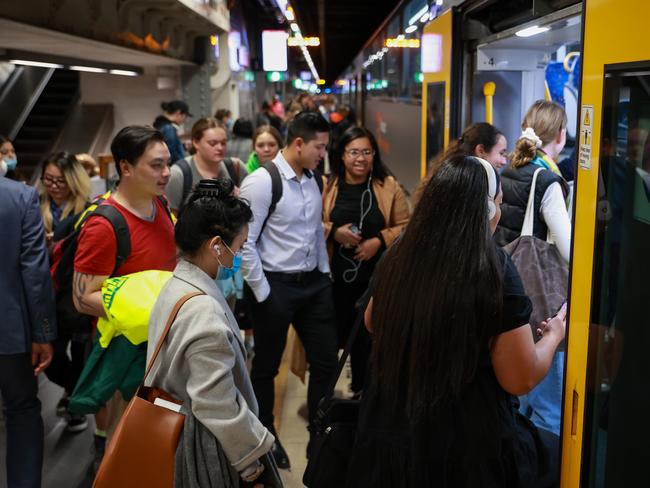CBD businesses feel the pain as passenger numbers dive in strike-stricken August
CBD businesses are the ones feeling the pain of Sydney’s repeated rail strikes, with passenger numbers nose-diving amid the transport uncertainty.
NSW
Don't miss out on the headlines from NSW. Followed categories will be added to My News.
Passenger numbers on NSW trains plunged by 8.5 per cent during August when industrial action crippled the rail network, with the drop leading to new concerns for CBD businesses.
Transport NSW figures for August, when the Rail, Tram and Bus Union (RTBU) undertook a rolling series of targeted strikes, show just 727,495 passengers tapped on with their Opal cards, compared to 792,853 in May.
Executive director of Business Sydney Paul Nicolaou said the strikes had “hurt thousands of small and medium sized businesses in the CBD in particular but many larger ones indirectly as well”.
They were also helping to “entrench” a work-from-home culture crippling the city’s recovery, he said.
“Each day the trains aren’t running can slash takings for a retail or hospitality business by around 25 per cent and for businesses close to a train station, the loss is more like a 40 per cent cut in customers,” he said.

“In the big picture the strikes entrench the work-from-home culture that is affecting the whole city by crippling the CBD economy and damaging its image for potential interstate and overseas visitors who want to enjoy a vibrant visitor destination.”
Transport Minister David Elliott said “this is why Sydneysiders have turned on the union”.
“They have expired all public support. This has gone beyond affecting commuters, students and families. It’s now having an extremely detrimental effect on our economy and our Covid recovery,” he said.
While the RTBU action in August included leaving gates open at train stations – which continues – it’s understood Transport NSW has been pleased by the high number of commuters continuing to tap on for their trips.
It comes as the crunch Fair Work Commission case between the government and the unions was deferred until Friday, to enable government lawyers more time to prepare documents.
Labor leader Chris Minns declined on Tuesday to comment on revelations, reported by The Daily Telegraph, that a union email to members stated “This government does not deserve a moment of peace between now and the next election. Enough is enough.”

Treasurer Matt Kean seized on the memo and claimed it showed the strikes were politically motivated.
RTBU NSW Secretary Alex Claassens said it was “disingenuous” of the government to blame the drop in commuters on the union, adding they had “deliberately inflamed the situation and stalled”.
“All of the actions rail workers have taken have been designed to cause a headache for management and the NSW Government while minimising the impact on commuters,” he said.
“The people responsible for dragging this dispute out are the government and management.”
Peter Galettis, owner of Sydney City Pharmacy in the CBD’s Queen Victoria Building (QVB), has felt the effects on his bottom line.

“My business has been affected terribly,” he said.
“It’s the inconsistency of the trains that’s the real problem.”
Mr Galettis said that while he understood the union’s concerns the strikes were hurting both commuters and businesses.
“We’re the victims,” he said.
“It’s not just the passengers but all the businesses. I’ve never seen the QVB so quiet.”

Nick Theo has run The Lucky Charm newsagency in the QVB for over 20 years. As his business faces onto Town Hall train station, it is heavily impacted by the strikes.
“Traffic flow reduces, turnover is affected,” Mr Theo said.
“I’d like to see it resolved, we want things to be running the way they should.
“We don’t need more disruption. With the way the rents are at the moment you can’t have your cash flow affected.”




